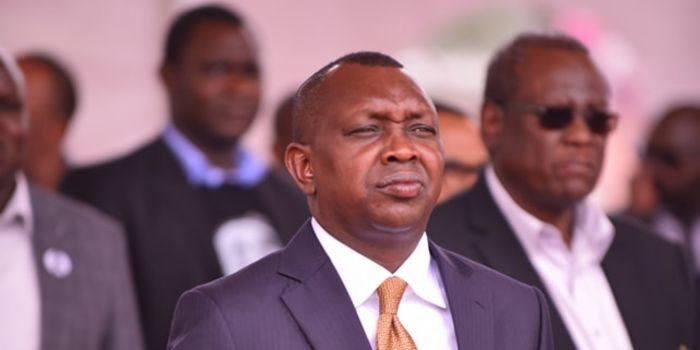Kapseret MP Oscar Sudi and other politicians faced unexpected resistance on Sunday, April 13, after a senior bishop stopped them from addressing worshippers during a church function in Githunguri, Kiambu County.
The incident occurred at the PCEA Githaithi Church, where several political leaders had gathered to participate in a fundraiser aimed at supporting the construction of a new church building.
Many people had assumed that, like in most similar events, the politicians present would be given a chance to speak to the congregation.
However, Bishop Peter Kinyanjui, who was leading the service, made it clear from the start that the pulpit would not be used for political messages.
“In recent months, you’ve seen the direction this country has been taking. The PCEA Church was actually one of the first churches to declare that politicians should not be allowed to speak at the pulpit,” said Bishop Kinyanjui.
He went further, directly referencing MP Sudi as an example of how politicians often change the focus of church gatherings by bringing in unrelated political matters.
“Why do we avoid giving politicians the microphone? Because they come with different agendas. If I allow Sudi to speak, he might start discussing politics and we’ll lose the whole purpose of the sermon,” the bishop added.
Bishop Kinyanjui also criticized the growing trend of leaders publicizing their donations in church. He warned against turning the church into a political stage where pledges are made more for attention than for genuine service to God and community.
Despite the firm stance taken by the bishop, Sudi was later seen whispering to the bishop, likely requesting a chance to speak briefly. Eventually, the lawmaker was given a short moment to address the congregation.
In his short remarks, Sudi acknowledged the bishop’s firm decision and agreed with the idea that churches should remain free from political talk.
“Bishop, you’ve actually confirmed what I’ve been thinking for a while,” Sudi said. “We politicians are the ones who have ruined the reputation of the church by turning the pulpit into a political platform.”
Sudi went on to assure the congregation that he is a devoted Christian and respects the church’s position. “Maybe the bishop doesn’t know me well, but I’m a Christian.
What you’ve done today is the right thing. We, the politicians, are the ones who spoiled everything by talking politics in church.”
He also revealed that before the service, there had been an agreement among the attending politicians not to speak on political matters during the church program.
Interestingly, even though the bishop had earlier discouraged politicians from making their donations public, a few pledges were eventually read out after Sudi’s remarks.
This seemed to soften the earlier tension between the church leadership and the visiting political leaders.
This incident mirrors a similar case that happened on March 16, where several prominent leaders, including then-Deputy President Rigathi Gachagua, Wiper party leader Kalonzo Musyoka, and Nairobi Governor Johnson Sakaja, were barred from addressing the congregation during a church service at ACK in Makadara. In that event, Archbishop Jackson Ole Sapit announced a new policy barring politicians from speaking inside ACK churches.
He emphasized that church services must remain sacred and free from political influence, stating that moving forward, no politician would be allowed to address congregants in any ACK church.
These recent events highlight a growing push by church leaders in Kenya to protect places of worship from political interference, encouraging religious gatherings to focus solely on spiritual matters rather than being used for political campaigns.
Join Our Political Forum official 2025 WhatsApp Channel To Stay Updated On time https://whatsapp.com/channel/0029VaWT5gSGufImU8R0DO30


